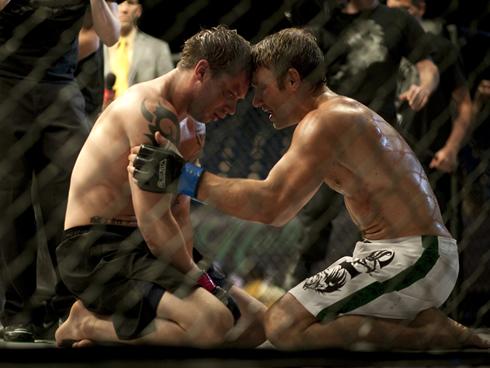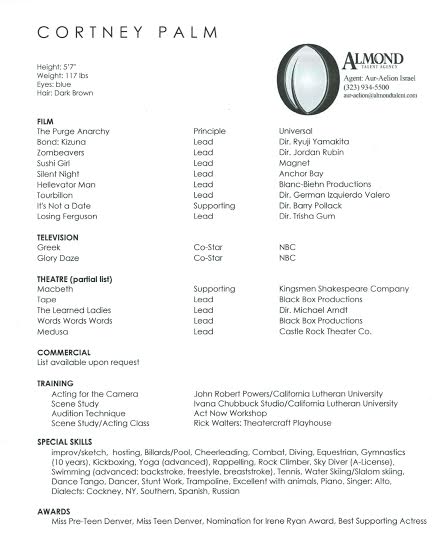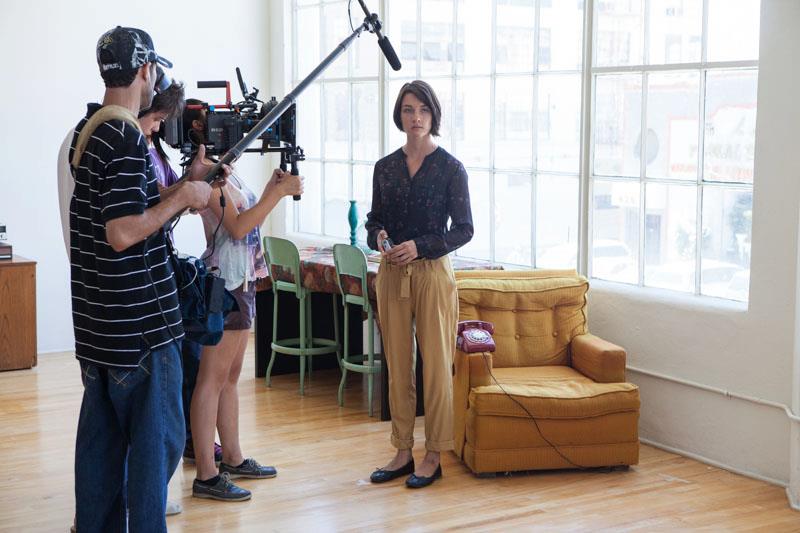On the outside the acting profession seems a glorious, glamorous, and money-making profession. Only after one attends film school, will they realize that money in Hollywood is scarce, and that money doesn’t grow on trees, but if it did, all the trees have been chopped down. Unless one is independently wealthy, or has a sugar daddy/mommy (literal or not) it is really hard to make a living as an actor in Hollywood. Here is a list of what is recommended (or even required of) actors in Hollywood. I will go into more detail on the items in the list in future blog posts.
Take it from someone who has been here for, eh-hem, ten years: me.
List:
Acting Class: (agents and casting directors, CDs, always ask who you study with or where you have trained.) Acting classes range from $250-$1200 a month! Some of those classes are only held 4 times a month!
Headshots (Shot/Printed/Uploaded): An actor needs at least 3 professional headshots that showcase different looks. Since CDs can’t use their imagination, it is recommended that actors have multiple headshots that show different looks: lawyer, student, nerd, mother, druggie, badass, doctor, etc. The list goes on and on. Should you wear scrubs in a headshot? NO! But it is a wise thing to indicate “doctor”. Some people like to dress up in their photos. I don’t think it’s necessary. But you can’t submit a cutesy image to a CD who is casting for a lawyer in Law & Order. Headshots cost from $150 (cheapos) to $1600 (EXCUSE ME?!!). Then you have to print off the headshots, and if you get more than one look, you are spending some $$ to get all those looks printed off. (AVOID Kinkos). THEN, (what there’s more?!) you have to upload these headshots to casting sites (will go into further detail in the future blog “What Acting Websites Should I Shell Out For?”) which can cost anywhere from $10/per photo to $25/per photo.

(I usually go out for the CW, ABC, and Indie movies where I play a girl with an attitude)
Business Cards: Networking is a HUGE part of being an actor. Although social media sites such as Facebook and LinkedIn are great ways to meet other professionals, if you are out and about, business cards are a great way to leave an impression on someone you meet. VistaPrint usually has good deals on 500 business cards and it’s an easy online process. I spend about $30.00 every year or so on business cards.
Postcards: Some people have postcards, some don’t. I personally think postcards are a great way to say “thank you!” or “Remember me?” I have actually sent out a postcard saying my thanks to a casting director for a great workshop, and a week after I sent it, I got a call to come in to audition! Do they work? Maybe! Do they annoy Casting? Maybe! Here is an example of one of my recent postcards. (Make it simple, Pitch yourself, and make it memorable).

Casting Director Workshops: I think these are a waste of money anymore; however, I do think they are pertinent to new actors. I do recommend them, because after I met with Dean Fronk (CD) he called me to audition twice for him. I also did a casting workshop with Michael Testa who called me in for Cold Case. So they do work, and they don’t work. It’s really up to you. I am just tired of spending $ on endless crap. One of the most well-known workshops is ACT NOW! and I do suggest checking them out, especially if you are not in the union (SAG-AFTRA), because then the CCD can see you and maybe bring you in to audition, considering how difficult it is to get an agent without TV credits and TV credits without being in the union or represented. It’s an endless catch-22.
Casting Websites: I will go in order from what I think is the best first: Actors Access, LACasting, Now Casting, Casting Frontier, CAZT, and most definitely EVERY actor should pay for IMDBPro! Please do AVOID Explore Talent, John Robert Powers, and Barbazon (nothing but scams and empty pockets).
Reel: If you don’t have any footage for a reel, film yourself doing a few different scenes that demonstrate your range, and even include a short monologue. You can also pay a reel company to shoot scenes with them and they will cut you a reel. Again prices range from $100-$1,000 and that doesn’t include the cost of uploading the footage to casting websites. To upload a reel onto Actors Access costs around $80, and to have it on LACasting is an additional $5-$10/month depending on your plan.
Union: To join SAG-AFTRA which is an actor’s union, and is the only way to book legit work costs 3 vouchers (proof of work under a SAG contract) and a whopping $3,000!! Each year, if you work or not, to stay in the union you must pay $198 in dues. SAG dues change depending on income earned under SAG-AFTRA contracts.
Rent: Unless you have a great, FLEXIBLE job, are independently wealthy, or have that sugar daddy, you will need to pay rent and living ANYWHERE in LA is NOT cheap. So find a roomie that you trust and get ready to spend $700-$2000/month on rent without utilities. Oh and did I mention that you need a flexible job in order to make it to auditions?? Good luck!
So if you have read the above and you’re thinking “Awesome! Let me buy a one-way ticket to LA” then kuddos to you!
Next step is finding an agent or manager who will represent you. As a new actor with ZERO credits it is extremely hard to get represented. From experience it all comes down to luck, or knowing someone. Some of my acquaintances have been pageant winners, or models which was an easy transition for them into Hollywood due to their amazing PR reps. But having a publicist is a whole other ball game. You need a PR team to get you into events, premiers, red carpet events, and interviews, but they need you to have something to promote, oh and did I mention they are upwards of $2,000/month!
Take a deep breath in, I want to help you, a nobody, make it in Hollywood. This blog is for those who are completely new to the business, people without nepotism, and those who want to feel as though they’re not alone in their struggle to make it as an actor.







